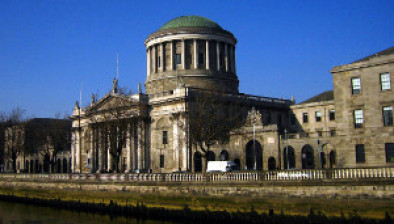Supreme Court: Minister was entitled to refuse visa extension for Canadian woman whose husband was studying in Ireland

The Supreme Court has held that the Minister for Justice and Equality was entitled to refuse a visa extension for a Canadian woman whose husband was studying in university in Ireland. The husband’s degree course lasted four years but the woman only had permission to remain in the State for two years.

About this case:
- Citation:[2023] IESC 2
- Judgment:
- Court:Supreme Court
- Judge:Mr Justice Gerard Hogan
Delivering judgment in the case, Mr Justice Gerard Hogan held that the woman’s rights under Article 8 of the European Convention of Human Rights were engaged by the case, but held that the Minister was entitled to deny further a visa extension having regard to the need to maintain integrity and coherence in the immigration scheme.
The decision was also notable for the court outlining the importance of raising parallel constitutional grounds of challenge where a case related to infringement of ECHR rights.
Background
The applicant was a Canadian woman who was married to her partner, a Canadian man. In 2018, her husband obtained a student visa to live and study in UCC for four years. The husband wished to qualify as a dentist and had made substantial sacrifices to get on the course.
The State also operated a special visa system for certain countries known as the Working Holiday Authorisation Scheme, where participants aged between 18 and 35 could travel to Ireland in order to study and work at the same time. However, the scheme was limited to allow a maximum stay in the State for two years and was expressly stated to be non-renewable.
The applicant applied and was granted a visa under the scheme. In December 2019, in advance of the expiry of her visa, the applicant applied to the Minister for an extension of her entitlement to remain in Ireland.
The application was refused on the grounds of public policy. Specifically, it was said that maintaining the integrity of the immigration system outweighed the features of the applicant’s case. As such, the applicant was required to leave the State on the expiry of her visa.
The applicant brought judicial review proceedings seeking to quash the decision. It was primarily argued that the decision violated her right to family life under Article 8 ECHR. Article 8(1) required the State to have respect for an individual’s private and family life, while Article 8(2) provided that a public authority may interfere with the exercise of this right in accordance with law and where it was necessary in a democratic society.
In the High Court, the decision was quashed. It was determined that the reasons that had been given by the Minister for the visa refusal were inadequate and were “so broad as to be meaningless”. Leave to appeal the decision to the Supreme Court was later granted.
Supreme Court
Mr Justice Hogan outlined the two issues which formed the appeal. First, the court was required to consider whether Article 8 ECHR was engaged on the facts of the case. Second, the court had to consider whether an interference with the applicant’s family life was necessary in a democratic society for the purposes of Article 8(2).
Prior to determining these issues, the court commented that the applicant raised ECHR grounds in the proceedings but did not raise corresponding constitutional grounds of challenge. Constitutional guarantees went further than those contained in the ECHR and the Constitution was the fundamental law of the State, the court said.
The court held that it would be inappropriate to grant leave to the applicant to amend her statement of grounds to include constitutional points. However, the court observed that legal professions should “ensure that the constitutional issues are raised appropriately in conjunction with any corresponding ECHR issues”.
Turning to the issues in the appeal, the court held that Article 8 ECHR was engaged by the Minister’s decision. The court observed that a person did not need to be a “dewy-eyed romantic” to see that the Minister’s decision was a significant interference with the private married life of the couple. The court noted the minimum gravity test laid out in R (Razgar) v. Home Secretary [2004] UKHL 27, which had been upheld by the Court of Appeal in CI v. Minister for Justice [2015] IECA 192. However, the recent decision of MK (Albania) v. Minister for Justice [2022] IESC 48 had overtaken these analyses.
Moreover, it was clear that the European Court of Human Rights had never adopted the analysis in Razgar. Mr Justice Hogan stated that the CI decision pitched the minimum gravity test “at too elevated a level”.
Since the Razgar/CI analysis was not supported by the text of Article 8 or by ECtHR jurisprudence, the court did not follow it. The Minister’s decision in this case would have required a married couple to live apart for two years, which went far beyond the threshold of any de minimis test.
However, the court held that, notwithstanding the engagement of Article 8(1) in the case, the Minister was entitled to refuse the visa extension based on Article 8(2). There was a strong public interest in the Minister adhering to the requirements of the scheme, which Ireland had joined with ten other countries.
Mr Justice Hogan noted that the applicant had signed a form which outlines that she would not receive any extensions. Absent exceptional circumstances, she was not in a position to complain about the refusal, the court said.
The court held that the Minister’s decision was justifiable having regard to the integrity of the immigration system as a whole. The court commented that the applicant had not really shown any special circumstances for remaining in Ireland beyond her desire to support her husband.
Considering the reasons given by the Minister for the refusal, the court held that the phrase “the interests of public policy and the common good in maintaining the integrity of the immigration system” was pithy. However, read in context, it properly conveyed the concerns of the Minister.
Conclusion
The court held that the Minister was incorrect to find that the applicant’s rights under Article 8(1) ECHR were not engaged by the case. Nonetheless, the Minister was entitled to refuse the visa extension pursuant to Article 8(2) ECHR, having regard to the public policy of maintaining integrity in the immigration system.
Middlekamp v. Minister for Justice and Equality [2023] IESC 2










